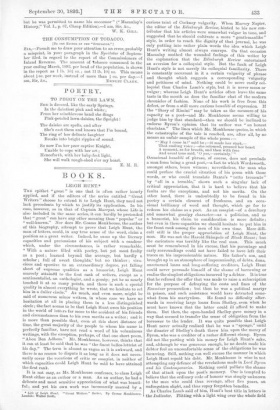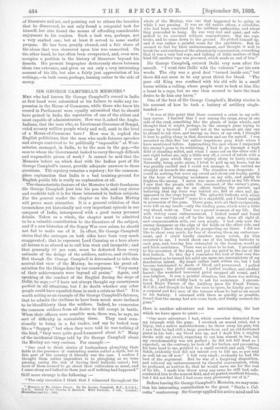BOOKS.
LEIGH HUNT.* THE epithet " great " is one that is often rather loosely applied, and if the editors of the series entitled "Great Writers" choose to extend it to Leigh Hunt, they need not lack precedents by which to justify its application. In his case, however, as in that of Captain Marryat, whose Life is also included in the same series, it can hardly be pretended that "great" can have any other meaning than " popular " or "well-known." Nor does Mr. Cosmo Monkhouse, the author of this biography, attempt to prove that Leigh Hunt, the man of letters, could, in any true sense of the word, claim a position as a great writer. Indeed, he sums up the literary capacities and pretensions of his subject with a candour which, under the circumstances, is rather remarkable. "With a nature filled with poetry, but yet most faulty as a poet ; learned beyond the average, but hardly a scholar ; full of sweet thoughts, but no thinker ; viva- cious and. sportive to an extraordinary degree, yet falling short of supreme qualities as a humorist, Leigh Hunt scarcely attaincld to the first rank of writers, except as a sentimentalist, an anthologist, and a gossip ; yet he so nearly touched it at so many points, and there is such a special quality in almost everything he wrote, that we hesitate to set him in a duller circle." As much, and even more, might be said of numerous minor writers, in whose case we have no hesitation at all in placing them in a less distinguished circle ; the fact seems to be that Leigh Hunt owes his position in the world of letters far more to the accident of his friends and circumstances than to his own merits as a writer; and it is more than possible that, even at this short distance of time, the great majority of the people to whom his name is perfectly familiar, have not read a word of his voluminous writings, with the exception, perhaps, of that one short poem, " Abou Ben Adhem." Mr. Monkhouse, however, thinks that it can at least be said that he was "the finest belles-lettrist of his day." The term is almost as vague as it is awkward, and there is no reason to dispute it as long as it does not neces- sarily cover the vocations of critic or essayist, in neither of which capacities could Leigh Hunt be said to have attained the first rank.
It is not easy, as Mr. Monkhouse confesses, to class Leigh Hunt either as an author or a man. As an author, he had a delicate and most sensitive appreciation of what was beauti- ful; and yet his own work was incessantly marred by a * Life of Leigh Hunt. "Groat Writers" Series, By Cosine Monlchouco. London; Walter Scott. curious taint of Cockney vulgarity. When Maevey Napier, the editor of the Edinburgh Review, hinted to his new con- tributor that his articles were somewhat vulgar in tone, and suggested that he should cultivate a more " gentlemanlike " style, in order to reach the dignity of that journal, he was only putting into rather plain words the idea which Leigh Hunt's writing almost always conveys. On that occasion Macaulay soothed the wounded feelings of this writer by the explanation that the Edinburgh Review entertained an aversion for a colloquial style. But the fault of Leigh Hunt's style is not merely its colloquial familiarity. There is constantly recurrent in it a certain vulgarity of phrase and thought which suggests a corresponding vulgarity and pettiness of mind. Nothing could be more easily col- loquial than Charles Lamb's style, but it is never mean or vulgar ; whereas Leigh Hunt's articles often leave the same taste in the mouth as does the familiar chat of the modern chronicler of fashion, None of his work is free from this defect, or from a still more curious banalite of expression. If the "Story of Rimini" may be taken as the measure of his capacity as a poet—and Mr. Monkhouse seems willing to judge him by that standard—then we should be inclined to endorse Byron's opinion that its author was "an honest charlatan." The lines which Mr. Monkhouse quotes, in which the catastrophe of the tale is reached, are, after all, by no means an unfair sample of the whole poem :— " May I come in ?' said he ;—it made her start,—
That smiling voice ;—she coloured, pressed her heart A moment, as for breath, and then with free And usual tone said, '0 yes,—certainly.'" Occasional banalite of phrase, of course, does not preclude a man from being a great poet,—a fact to which Wordsworth, amongst others, hears witness; nevertheless, the man who could preface the crucial situation of his poem with those words, or who could translate Dante's " tutto tremente" by "all in a tremble," shows such a singular lack of critical appreciation, that it is hard to believe that his faults are the exceptions, and not his merits. On the other hand, there is undoubtedly to be found in his poetry a certain element of freshness, and an occa- sional brilliancy of word and, thought, which go far to redeem his claims as a poet. As an essayist—of a desultory and somewhat gossipy character—as a politician, and as a humorist, his claim to consideration is more definite ; but even in these capacities we should hesitate to put him in the front rank among the men of his own time. More diffi- cult still is the proper appreciation of Leigh Hunt, the man. He was not the Harold Skimpole of Bleak House; but the caricature was terribly like the real man. This much must be remembered in his excuse, that his parentage and early surroundings could not have failed to have left their traces on his impressionable nature. His father's son, and brought up in an atmosphere of impecuniosity, of debts, duns, unreturned loans and long-suffering creditors, Leigh Hunt could never persuade himself of the shame of borrowing or realise the simplest obligations incurred by a debtor. It is true that he refused the offer that was made to raise a subscription for the purpose of defraying the costs and fines of the Ealaminer prosecution ; but then he was a political martyr in prison, and such assistance would have detracted some- what from his martyrdom. He found no difficulty after- wards in receiving large loans from Shelley, even when he must have known that the latter could ill afford to make them. But then, the open-handed Shelley gave money in a way that seemed to transfer the sense of obligation from the borrower to the lender. It was quite possible that Leigh Hunt never actually realised that he was a "sponge," until the disaster of Shelley's death threw him upon the mercy of Byron, who was a creditor of a rather different stamp. Byron did not like parting with his money for Leigh Hunt's sake, and, although he was generous enough, be no doubt made his debtor feel an uncomfortable sense of the obligations he was incurring. Still, nothing can well excuse the manner in which Leigh Hunt repaid his debt. Mr. Monkhouse is wise in not attempting any defence of the revelations made in Lord Byron and his Contemporaries. Nothing could palliate the shame of that attack upon the poet's memory. One is tempted to believe that the ordinary code of honour was simply unknown to the man who could thus revenge, after five years, an nnforgotten slight, and thus repay forgotten benefits. As Charles Lamb said of him, Hunt's beat title in letters is the Indicator. Flitting with a light wing over the whole field of literature and art, and pointing out to others the beauties that he discovered, he not only found a congenial task for himself, but also found the means of affording considerable enjoyment to his readers. Such a task was, perhaps, not a very exalted one; but at least it served to some useful purpose. He has been greatly abused, and a fair share of the abuse that was showered upon him was unmerited. On the other hand, he has often been overpraised, and, even now, occupies a position in the history of literature beyond his deserts. His present biographer dexterously steers between these two extremes, and gives us not only a very interesting account of his life, but also a fairly just appreciation of his writings,—in both cases, perhaps, leaning rather to the side of mercy.



































 Previous page
Previous page